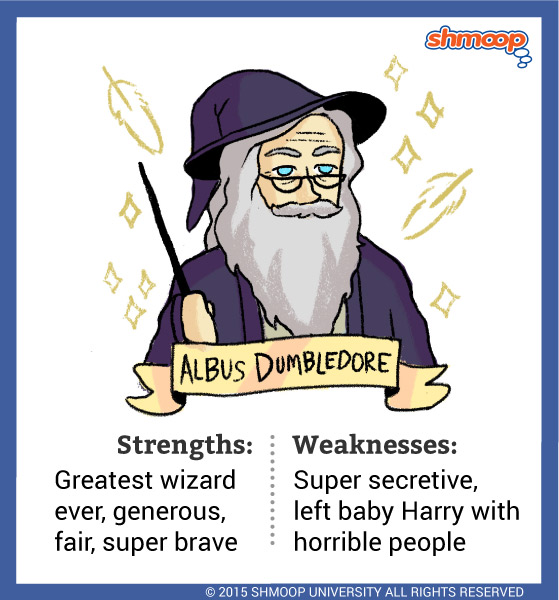Character Analysis

(Click the character infographic to download.)
Professor: Headmaster
Like Voldemort (didn't think we were going in that direction, did you?), Dumbledore's presence is felt throughout the book, even though he doesn't appear frequently in person. In fact, aside from getting some references to Dumbledore at the start, we only get about three really substantial scenes with him in the entire novel. Given what a big deal the guy is, we might have expected him to be around more. The scenes where he is around are all highly thematically significant though.
First, we have the scene in which our favorite three kids overhear him discussing Sirius Black's break-in with Snape and Percy. This scene tells us a lot about Dumbledore – we learn that he really dislikes the Dementors, which tells us that he's not the type to compromise his beliefs or values in order to get something done. We also get some insight into his rather tense relationship with Snape. Snape, like nearly every other character in the book, seems to place a huge amount of value on Dumbledore's trust and approval.
"I do not believe that a single person inside this castle would have helped Black enter it," said Dumbledore, and his tone made it so clear that the subject was closed that Snape didn't reply. [....]
[…] Dumbledore left the hall, walking quickly and quietly. Snape stood for a moment, watching the headmaster with an expression of deep resentment on his face; then he too left. (9.1.42-45)
Dumbledore seems disappointed with Snape, but he also appears to regret the fact that he can't appease Snape. His tone in this entire scene is firm yet quiet, and his short statements hint at his turbulent emotions here.
Second, we have the scene in which Dumbledore sends Harry and Hermione back in time – he effectively kicks off one of the book's most exciting and memorable episodes here. And all of this is because he believes Sirius's story, making him one of the few people to do so.
Finally, we have the traditional closing scene with Harry and Dumbledore, where they talk about all the lessons that Harry has learned over the year. Harry and Dumbledore have a classic mentor/mentee relationship. Dumbledore does his standard closing remarks routine here – drops a cryptic hint about the future (with his comment about Harry someday being glad about saving Peter) and drops cryptic hints about the past (Trelawney's given two accurate predictions? What?). He then reassures our stressed-out hero that he's done a good job, and offers up some highly quotable life lessons, like this:
"Your father is alive in you, Harry, and shows himself most plainly when you have need of him. How else could you produce that particular Patronus?" (22.3.54)
With all of this, we can see why Dumbledore is held in such high esteem by everyone in the wizarding community – he's infinitely wise, but is also very approachable and even funny. So it's not surprising that Harry implicitly trusts the Hogwarts Headmaster. Dumbledore is a good guy to have in your corner, but as Harry learns this year, even he isn't able to stop outside threats from coming in.